Publications
Publications by categories in reversed chronological order. Please get in touch via email if you cannot access any publications but want a copy.
2025
- Article
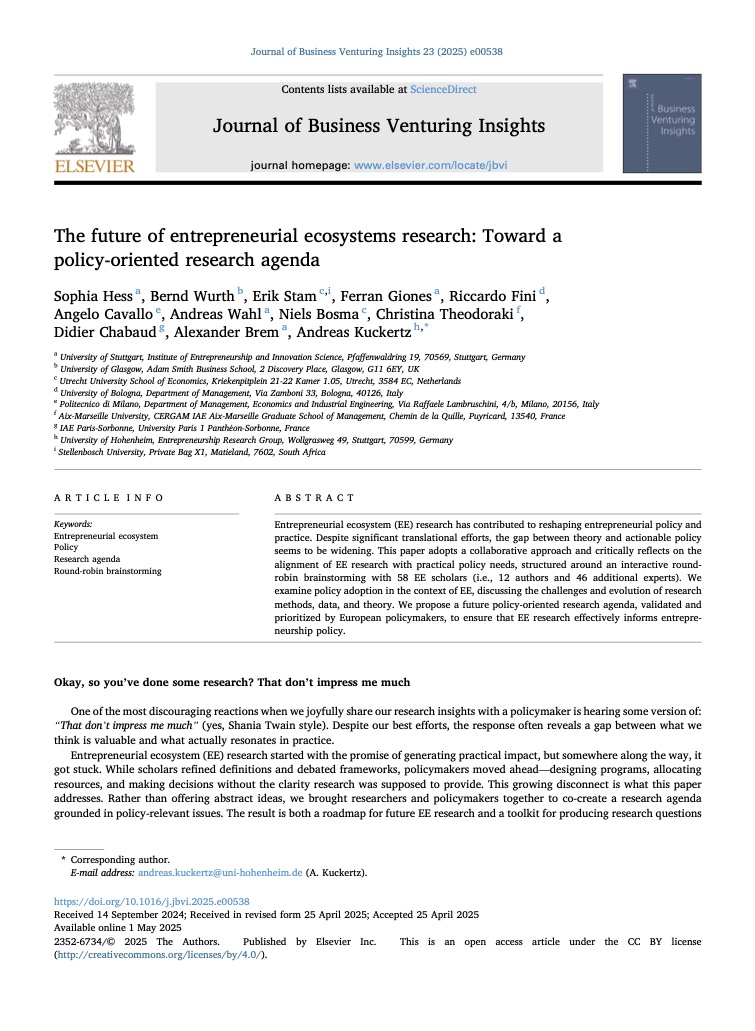 The future of entrepreneurial ecosystems research: Toward a policy-oriented research agendaSophia Hess, Bernd Wurth, Erik Stam, and 9 more authorsJournal of Business Venturing Insights, 2025
The future of entrepreneurial ecosystems research: Toward a policy-oriented research agendaSophia Hess, Bernd Wurth, Erik Stam, and 9 more authorsJournal of Business Venturing Insights, 2025Entrepreneurial ecosystem (EE) research has contributed to reshaping entrepreneurial policy and practice. Despite significant translational efforts, the gap between theory and actionable policy seems to be widening. This paper adopts a collaborative approach and critically reflects on the alignment of EE research with practical policy needs, structured around an interactive round-robin brainstorming with 58 EE scholars (i.e., 12 authors and 46 additional experts). We examine policy adoption in the context of EE, discussing the challenges and evolution of research methods, data, and theory. We propose a future policy-oriented research agenda, validated and prioritized by European policymakers, to ensure that EE research effectively informs entrepreneurship policy.
@article{heswursta25, title = {The future of entrepreneurial ecosystems research: Toward a policy-oriented research agenda}, author = {Hess, Sophia and Wurth, Bernd and Stam, Erik and Giones, Ferran and Fini, Riccardo and Cavallo, Angelo and Wahl, Andreas and Bosma, Niels and Theodoraki, Christina and Chabaud, Didier and Brem, Alexander and Kuckertz, Andreas}, journal = {Journal of Business Venturing Insights}, volume = {23}, pages = {e00538}, year = {2025}, doi = {10.1016/j.jbvi.2025.e00538}, google_scholar_id = {g5m5HwL7SMYC}, }
2024
- Article
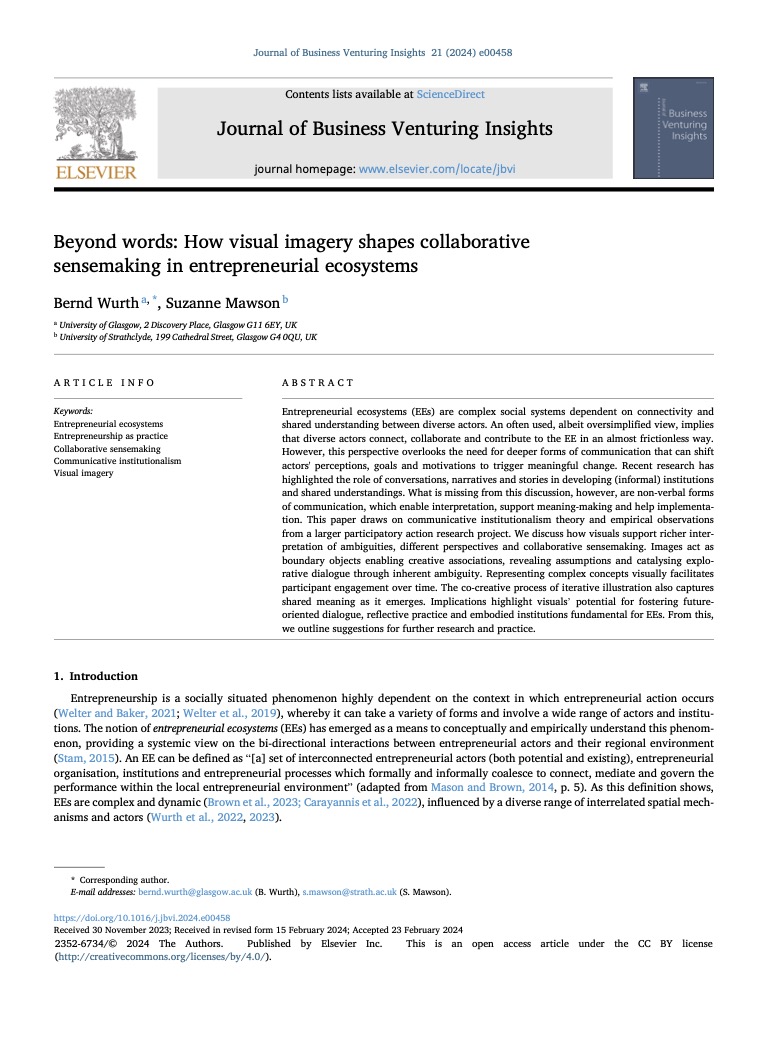 Beyond words: How visual imagery shapes collaborative sensemaking in entrepreneurial ecosystemsBernd Wurth, and Suzanne MawsonJournal of Business Venturing Insights, 2024
Beyond words: How visual imagery shapes collaborative sensemaking in entrepreneurial ecosystemsBernd Wurth, and Suzanne MawsonJournal of Business Venturing Insights, 2024Entrepreneurial ecosystems (EEs) are complex social systems dependent on connectivity and shared understanding between diverse actors. An often used, albeit oversimplified view, implies that diverse actors connect, collaborate and contribute to the EE in an almost frictionless way. However, this perspective overlooks the need for deeper forms of communication that can shift actors’ perceptions, goals and motivations to trigger meaningful change. Recent research has highlighted the role of conversations, narratives and stories in developing (informal) institutions and shared understandings. What is missing from this discussion, however, are non-verbal forms of communication, which enable interpretation, support meaning-making and help implementation. This paper draws on communicative institutionalism theory and empirical observations from a larger participatory action research project. We discuss how visuals support richer interpretation of ambiguities, different perspectives and collaborative sensemaking. Images act as boundary objects enabling creative associations, revealing assumptions and catalysing explorative dialogue through inherent ambiguity. Representing complex concepts visually facilitates participant engagement over time. The co-creative process of iterative illustration also captures shared meaning as it emerges. Implications highlight visuals’ potential for fostering future-oriented dialogue, reflective practice and embodied institutions fundamental for EEs. From this, we outline suggestions for further research and practice.
@article{wurmaw24, title = {Beyond words: How visual imagery shapes collaborative sensemaking in entrepreneurial ecosystems}, author = {Wurth, Bernd and Mawson, Suzanne}, journal = {Journal of Business Venturing Insights}, volume = {21}, pages = {e00458}, year = {2024}, doi = {10.1016/j.jbvi.2024.e00458}, google_scholar_id = {2P1L_qKh6hAC}, } - Article
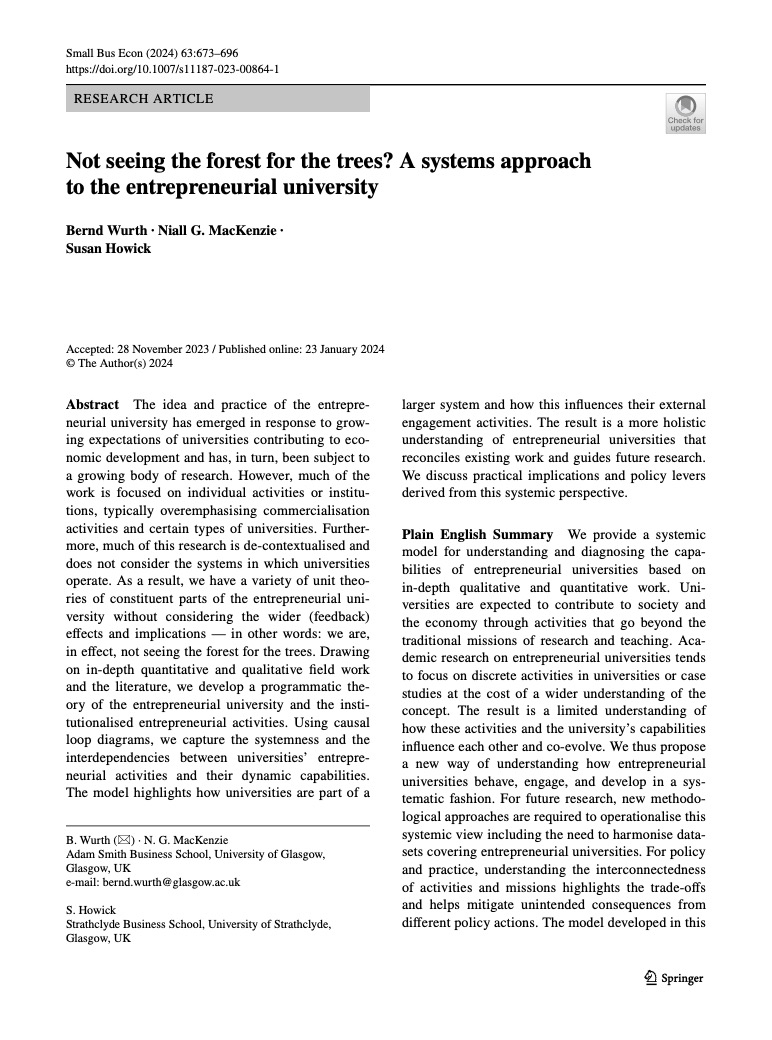 Not seeing the forest for the trees? A systems approach to the entrepreneurial universityBernd Wurth, Niall MacKenzie, and Susan HowickSmall Business Economics, 2024
Not seeing the forest for the trees? A systems approach to the entrepreneurial universityBernd Wurth, Niall MacKenzie, and Susan HowickSmall Business Economics, 2024The idea and practice of the entrepreneurial university has emerged in response to growing expectations of universities contributing to economic development and has, in turn, been subject to a growing body of research. However, much of the work is focused on individual activities or institutions, typically overemphasising commercialisation activities and certain types of universities. Furthermore, much of this research is de-contextualised and does not consider the systems in which universities operate. As a result, we have a variety of unit theories of constituent parts of the entrepreneurial university without considering the wider (feedback) effects and implications — in other words: we are, in effect, not seeing the forest for the trees. Drawing on in-depth quantitative and qualitative field work and the literature, we develop a programmatic theory of the entrepreneurial university and the institutionalised entrepreneurial activities. Using causal loop diagrams, we capture the systemness and the interdependencies between universities’ entrepreneurial activities and their dynamic capabilities. The model highlights how universities are part of a larger system and how this influences their external engagement activities. The result is a more holistic understanding of entrepreneurial universities that reconciles existing work and guides future research. We discuss practical implications and policy levers derived from this systemic perspective.
@article{wurmachow24, title = {Not seeing the forest for the trees? A systems approach to the entrepreneurial university}, author = {Wurth, Bernd and MacKenzie, Niall and Howick, Susan}, journal = {Small Business Economics}, volume = {63}, number = {2}, pages = {673--696}, year = {2024}, doi = {10.1007/s11187-023-00864-1}, dimensions = {true}, google_scholar_id = {70eg2SAEIzsC}, } - Chapter
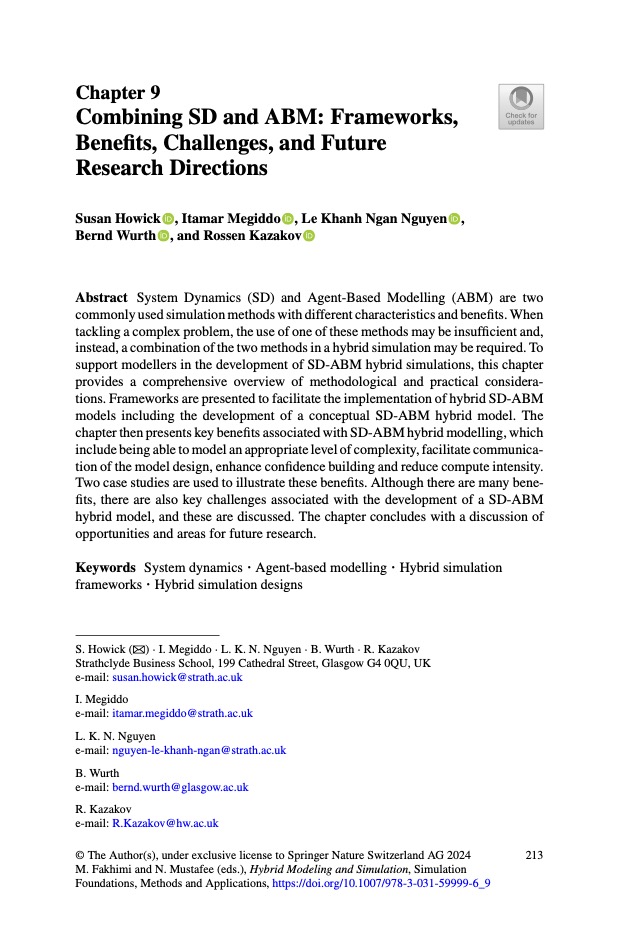 Combining SD & ABM: Frameworks, benefits, challenges, and future research directionsSusan Howick, Itamar Megiddo, Le Khanh Ngan Nguyen, and 2 more authors, Cham, 2024
Combining SD & ABM: Frameworks, benefits, challenges, and future research directionsSusan Howick, Itamar Megiddo, Le Khanh Ngan Nguyen, and 2 more authors, Cham, 2024System Dynamics (SD) and Agent-Based modelling (ABM) are two commonly used simulation methods with different characteristics and benefits. When tackling a complex problem, the use of one of these methods may be insufficient and, instead, a combination of the two methods in a hybrid simulation may be required. To support modellers in the development of SD-ABM hybrid simulations, this chapter provides a comprehensive overview of methodological and practical considerations. Frameworks are presented to facilitate the implementation of hybrid SD-ABM models including the development of a conceptual SD-ABM hybrid model. The chapter then presents key benefits associated with SD-ABM hybrid modelling, which include being able to model an appropriate level of complexity, facilitate communication of the model design, enhance confidence building and reduce compute intensity. Two case studies are used to illustrate these benefits. Although there are many benefits, there are also key challenges associated with the development of a SD-ABM hybrid model and these are discussed. The chapter concludes with a discussion of opportunities and areas for future research.
@inbook{howmegngu24, title = {Combining SD & ABM: Frameworks, benefits, challenges, and future research directions}, booktitle = {Hybrid Modeling and Simulation: Conceptualizations, Methods, and Applications}, author = {Howick, Susan and Megiddo, Itamar and Nguyen, Le Khanh Ngan and Wurth, Bernd and Kazakov, Rossen}, editor = {Fakhimi, M. and Mustafee, Navonil}, publisher = {Springer}, location = {Cham}, year = {2024}, doi = {10.1007/978-3-031-59999-6_9}, google_scholar_id = {ldfaerwXgEUC}, }
2023
- Article
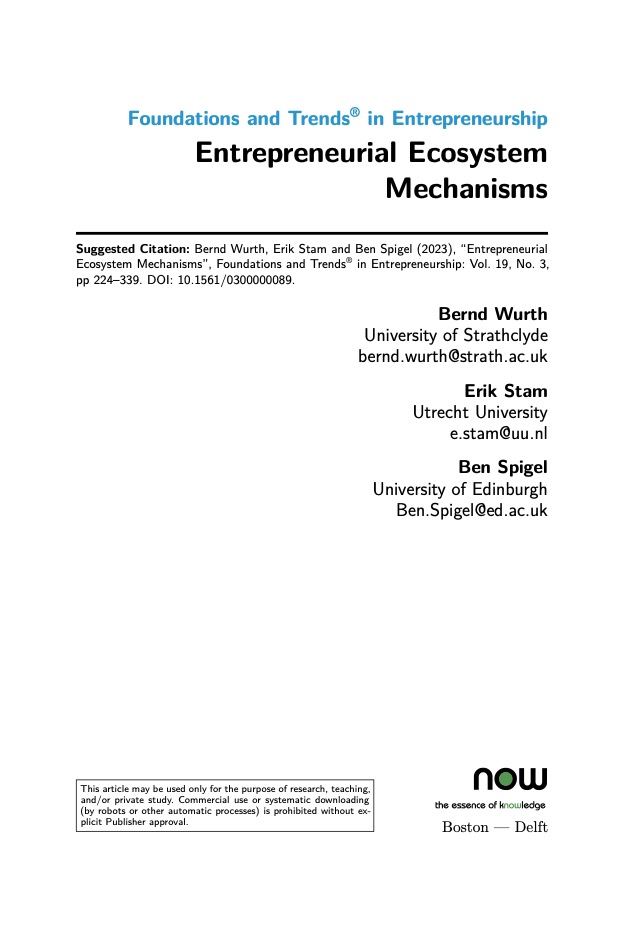 Entrepreneurial Ecosystem MechanismsBernd Wurth, Erik Stam, and Ben SpigelFoundations and Trends in Entrepreneurship, also published as a book (ISBN: 978-1-63828-256-3) , 2023
Entrepreneurial Ecosystem MechanismsBernd Wurth, Erik Stam, and Ben SpigelFoundations and Trends in Entrepreneurship, also published as a book (ISBN: 978-1-63828-256-3) , 2023Entrepreneurial ecosystems have developed from a powerful idea and concept into a transdisciplinary research program, increasing our understanding into entrepreneurship-led development and providing actionable knowledge for improving the conditions for entrepreneurship and development. In this monograph we take stock of the progress to date and synthesize the findings of 181 empirical scientific entrepreneurial ecosystem studies through a systematic literature review. We organize the review around five key mechanisms that explain the nature and development of entrepreneurial ecosystems: (1) interdependence of its elements, (2) upward causation explaining entrepreneurial ecosystem outputs and (3) outcomes, (4) downward causation and path dependence, and (5) inter-ecosystem links. We summarize the findings and outline opportunities for research and discuss policy implications in the light of a transdisciplinary entrepreneurial ecosystem research program. This monograph is of interest for scholars of all academic disciplines that provide knowledge that is relevant for the understanding of entrepreneurial ecosystems, entrepreneurship and entrepreneurship-led development, but also for all stakeholders involved in the development of entrepreneurial ecosystems.
@article{wurstaspi23, title = {Entrepreneurial Ecosystem Mechanisms}, author = {Wurth, Bernd and Stam, Erik and Spigel, Ben}, journal = {Foundations and Trends in Entrepreneurship}, volume = {19}, number = {3}, pages = {224--339}, year = {2023}, doi = {10.1561/0300000089}, google_scholar_id = {35N4QoGY0k4C}, }
2022
- Article
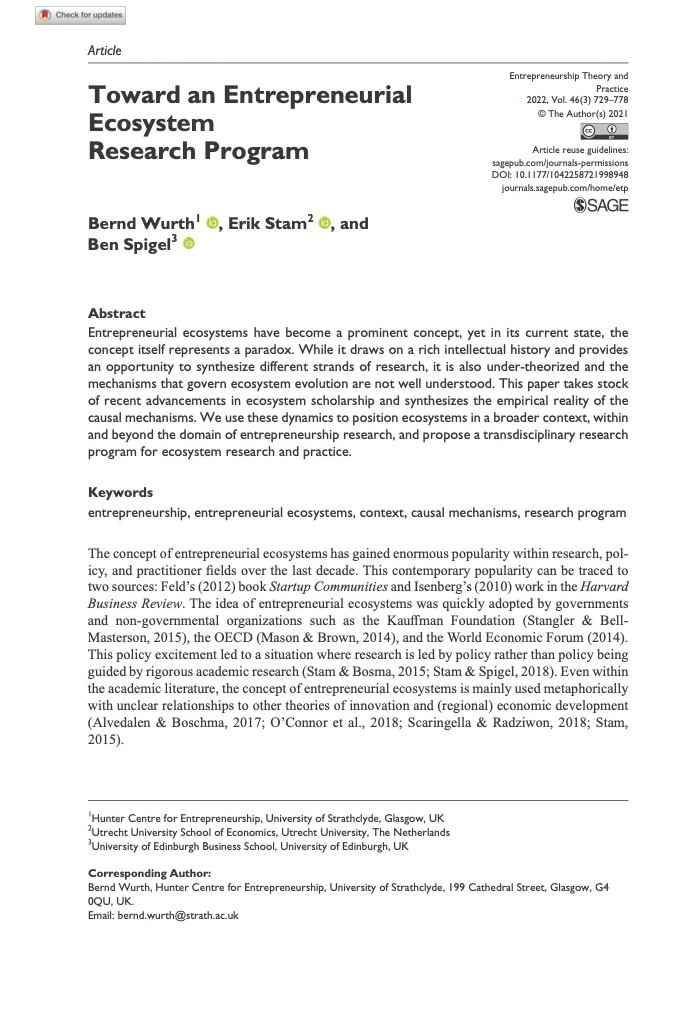 Toward an Entrepreneurial Ecosystem Research ProgramBernd Wurth, Erik Stam, and Ben SpigelEntrepreneurship Theory and Practice, 2022
Toward an Entrepreneurial Ecosystem Research ProgramBernd Wurth, Erik Stam, and Ben SpigelEntrepreneurship Theory and Practice, 2022Entrepreneurial ecosystems have become a prominent concept, yet in its current state, the concept itself represents a paradox. While it draws on a rich intellectual history and provides an opportunity to synthesize different strands of research, it is also under-theorized and the mechanisms that govern ecosystem evolution are not well understood. This paper takes stock of recent advancements in ecosystem scholarship and synthesizes the empirical reality of the causal mechanisms. We use these dynamics to position ecosystems in a broader context, within and beyond the domain of entrepreneurship research, and propose a transdisciplinary research program for ecosystem research and practice.
@article{wurstaspi22, title = {Toward an Entrepreneurial Ecosystem Research Program}, author = {Wurth, Bernd and Stam, Erik and Spigel, Ben}, journal = {Entrepreneurship Theory and Practice}, volume = {46}, number = {3}, pages = {729--778}, year = {2022}, doi = {10.1177/1042258721998948}, dimensions = {true}, google_scholar_id = {J_g5lzvAfSwC}, } - Article
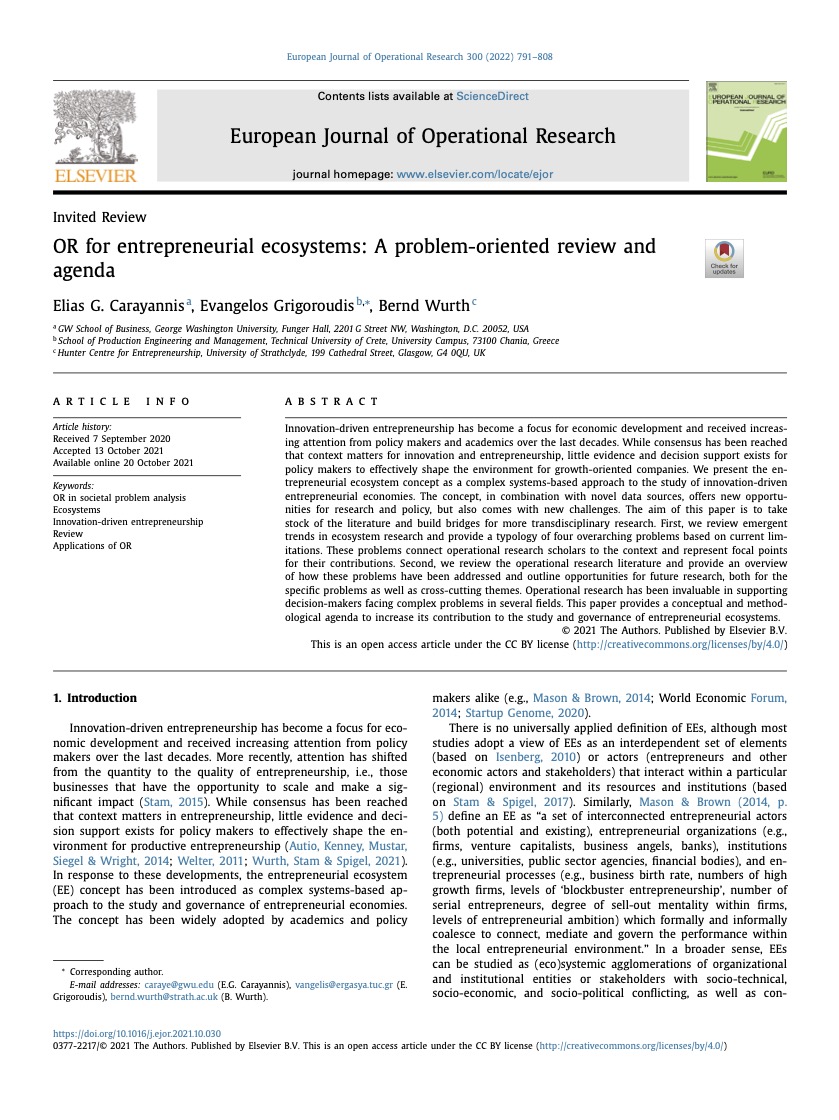 OR for Entrepreneurial Ecosystems: A Problem-Oriented Review and AgendaElias G. Carayannis, Evangelos Grigoroudis, and Bernd WurthEuropean Journal of Operational Research, 2022
OR for Entrepreneurial Ecosystems: A Problem-Oriented Review and AgendaElias G. Carayannis, Evangelos Grigoroudis, and Bernd WurthEuropean Journal of Operational Research, 2022Innovation-driven entrepreneurship has become a focus for economic development and received increasing attention from policy makers and academics over the last decades. While consensus has been reached that context matters for innovation and entrepreneurship, little evidence and decision support exists for policy makers to effectively shape the environment for growth-oriented companies. We present the entrepreneurial ecosystem concept as a complex systems-based approach to the study of innovation-driven entrepreneurial economies. The concept, in combination with novel data sources, offers new opportunities for research and policy, but also comes with new challenges. The aim of this paper is to take stock of the literature and build bridges for more transdisciplinary research. First, we review emergent trends in ecosystem research and provide a typology of four overarching problems based on current limitations. These problems connect operational research scholars to the context and represent focal points for their contributions. Second, we review the operational research literature and provide an overview of how these problems have been addressed and outline opportunities for future research, both for the specific problems as well as cross-cutting themes. Operational research has been invaluable in supporting decision-makers facing complex problems in several fields. This paper provides a conceptual and methodological agenda to increase its contribution to the study and governance of entrepreneurial ecosystems.
@article{cargriwur22, title = {OR for Entrepreneurial Ecosystems: A Problem-Oriented Review and Agenda}, author = {Carayannis, Elias G. and Grigoroudis, Evangelos and Wurth, Bernd}, journal = {European Journal of Operational Research}, volume = {300}, number = {3}, pages = {791--808}, year = {2022}, doi = {10.1016/j.ejor.2021.10.030}, google_scholar_id = {vV6vV6tmYwMC}, }
2020
- Thesis
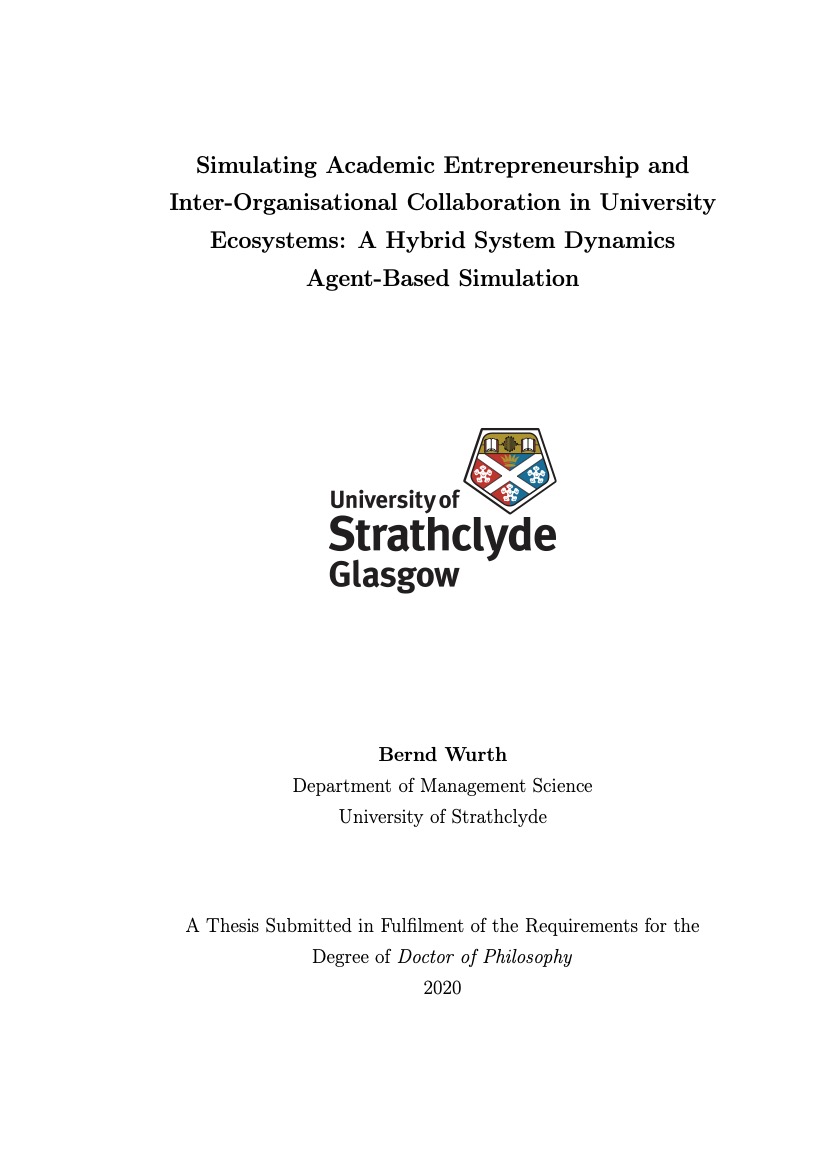 Simulating Academic Entrepreneurship and Inter-Organisational Collaboration in University Ecosystems: A Hybrid System Dynamics Agent-Based SimulationBernd Wurth2020
Simulating Academic Entrepreneurship and Inter-Organisational Collaboration in University Ecosystems: A Hybrid System Dynamics Agent-Based SimulationBernd Wurth2020Universities are increasingly expected to actively contribute to socio-economic development. Academic entrepreneurship and the evolution of the entrepreneurial university within ecosystems have received increasing attention from both policymakers and academic communities over the last decades. However, most studies on universities’ external engagement have focused on individual activities and single universities, hereby neglecting the feedback effects between different activities and how universities are linked through an overlap of their ecosystems. The result is an incomplete understanding of how universities interact with their ecosystem and the resulting inter- and intra-organisational dynamics. This research addresses this issue by developing a hybrid system dynamics agent-based model, which captures feedback structure and the internal decision-making of universities and companies. Both the conceptual and simulation model are based on a triangulation of the literature, interviews with representatives of Scottish universities, and secondary data for Scottish universities and UK businesses. This research makes several theoretical, methodological, and empirical contributions. From a theoretical perspective, it contributes in two distinct ways to the field of entrepreneurship by defining university ecosystems in new way that provides a basis for future research and developing a multi-modal simulation model that can be applied in tested in different contexts. The methodological contributions to the field of modelling and simulation in management science include a modelling process for hybrid simulations, new practices for modelling the size of agent populations through different designs of stocks and flows in the system dynamics module in hybrid simulations, and complex events for recognising emergent behaviour. Lastly, this research makes two empirical contributions to the field of entrepreneurship. This research shines a light on the dynamics of academic entrepreneurship and how universities can partially overcome a low research prestige to increase academic entrepreneurship. Implications for policy and practice are outlined and opportunities for future research conclude this thesis.
@book{wur20, title = {Simulating Academic Entrepreneurship and Inter-Organisational Collaboration in University Ecosystems: A Hybrid System Dynamics Agent-Based Simulation}, author = {Wurth, Bernd}, publisher = {University of Strathclyde}, year = {2020}, google_scholar_id = {NaGl4SEjCO4C}, }
2019
- Article
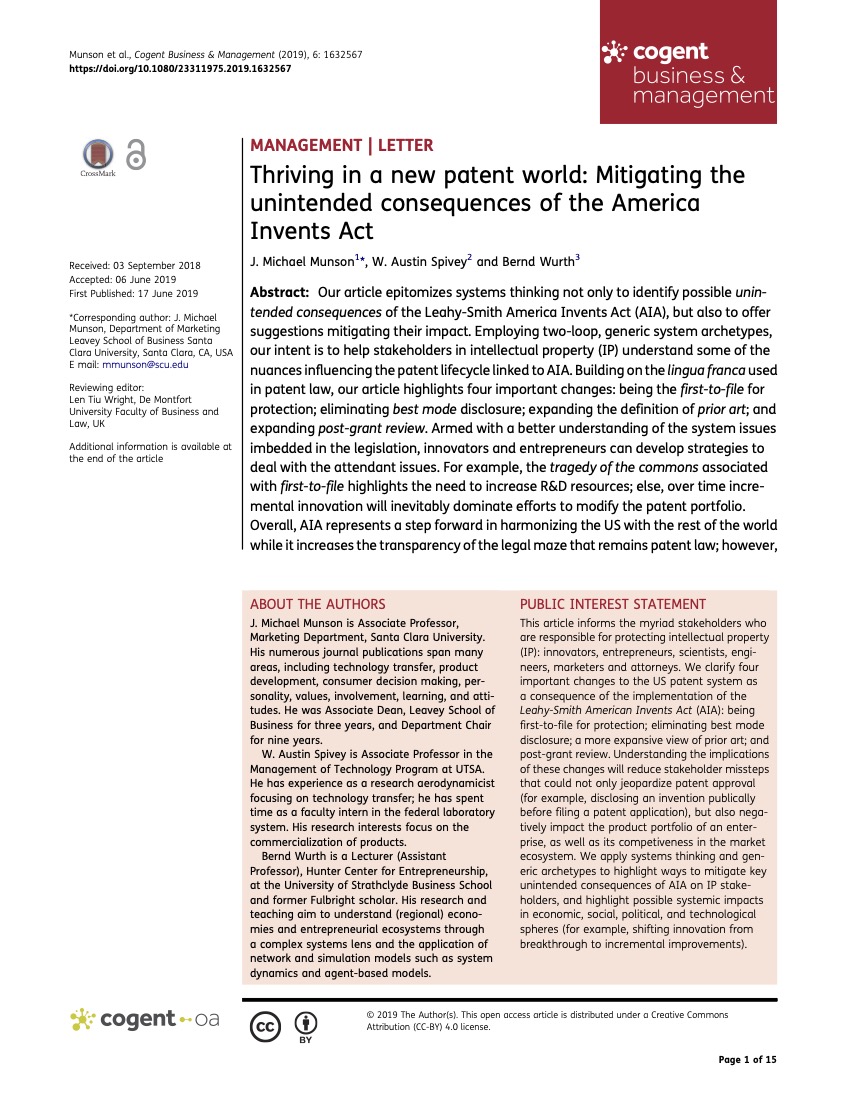 Thriving in a new patent world: Mitigating the unintended consequences of the America Invents ActJ. Michael Munson, W. Austin Spivey, and Bernd WurthCogent Business & Management, 2019
Thriving in a new patent world: Mitigating the unintended consequences of the America Invents ActJ. Michael Munson, W. Austin Spivey, and Bernd WurthCogent Business & Management, 2019Our article epitomizes systems thinking not only to identify possible unintended consequences of the Leahy-Smith America Invents Act (AIA), but also to offer suggestions mitigating their impact. Employing two-loop, generic system archetypes, our intent is to help stakeholders in intellectual property (IP) understand some of the nuances influencing the patent lifecycle linked to AIA. Building on the lingua franca used in patent law, our article highlights four important changes: being the first-to-file for protection; eliminating best mode disclosure; expanding the definition of prior art; and expanding post-grant review. Armed with a better understanding of the system issues imbedded in the legislation, innovators and entrepreneurs can develop strategies to deal with the attendant issues. For example, the tragedy of the commons associated with first-to-file highlights the need to increase R&D resources; else, over time incremental innovation will inevitably dominate efforts to modify the patent portfolio. Overall, AIA represents a step forward in harmonizing the US with the rest of the world while it increases the transparency of the legal maze that remains patent law; however, the changes bring allocation issues, secrecy, and time pressure to the forefront of the conversation about new product development. Recognition of these impacts is relevant worldwide for anyone contemplating a US patent or any entity attempting to maintain a viable portfolio of intellectual property.
@article{munspiwur19, title = {Thriving in a new patent world: Mitigating the unintended consequences of the America Invents Act}, author = {Munson, J. Michael and Spivey, W. Austin and Wurth, Bernd}, journal = {Cogent Business & Management}, volume = {6}, number = {1}, pages = {1632567}, year = {2019}, doi = {10.1080/23311975.2019.1632567}, google_scholar_id = {BqipwSGYUEgC}, } - Report
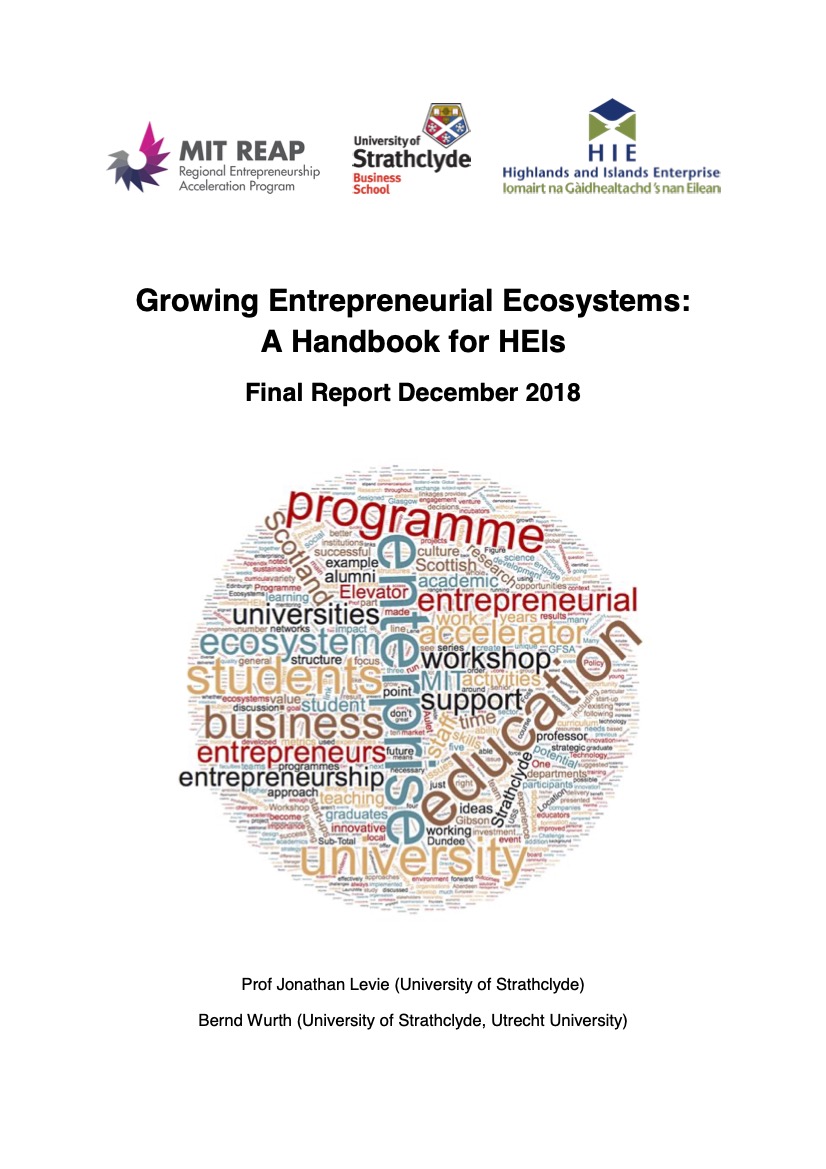 Growing Entrepreneurial Ecosystems: A Handbook for HEIsJonathan Levie, and Bernd Wurth2019
Growing Entrepreneurial Ecosystems: A Handbook for HEIsJonathan Levie, and Bernd Wurth2019Scotland has an ambitious goal to become a world-leading entrepreneurial and innovative country. As part of these efforts, Scotland participated in the MIT Regional Entrepreneurship Acceleration Program (REAP) from 2012 to 2014. A key issue identified by REAP was the role of Higher Education Institutions (HEIs) in Scotland’s innovation-driven entrepreneurial ecosystem. While HEIs have accelerated their engagement with industrial and other external partners and promotion and support of entrepreneurial behaviour among students and staff, particularly in recent years (Universities Scotland, 2018a), the REAP Scotland report identified that there was scope to share best practice. Funded by Highlands and Islands Enterprise (HIE) and led by REAP core team member Prof Jonathan Levie (University of Strathclyde) and the REAP Universities High Level Task Group (UHLTG), four interactive and practice-oriented best practice workshops were conducted to address this issue: ‘Mapping University Ecosystems’ (2015, University of Dundee), ‘Incubators and Accelerators’ (2015, Elevator, Aberdeen), ‘Enterprise Education’ (2016) and an ‘Ecosystem Exchange Activity’ (2018), both at the University of Strathclyde, Glasgow). On the basis of these workshops and the state-of-the-art of the academic literature on entrepreneurial universities, this report presents a process-oriented framework for HEI entrepreneurial ecosystems to nurture entrepreneurial activities among staff, students, and graduates. HEI entrepreneurial ecosystems emerge from the “strategic and collective actions of various organizational components [...] in order to maximize both the entrepreneurial and innovative contributions of universities” (Hayter, 2016, p. 634). To enable this: 1. HEIs should understand their own entrepreneurial ecosystem and create a supportive environment for its development. This environment includes an entrepreneurial and innovative culture; policies that support and reward entrepreneurial activities; and efforts to connect staff, students, and alumni; all coordinated and promoted through a clear vision and strategy. 2. HEIs should develop clear internal pathways for entrepreneurial staff, students and alumni and constantly monitor their effectiveness and adjust if necessary. Many HEIs offer a variety of programmes and different ways of supporting entrepreneurial students, staff and alumni. The challenge for most HEIs is to provide a clear path for their constituents in order to help them navigate through the opportunities and resources that are available to them. 3. Technology-based ventures typically need more resources than a HEI on its own can provide. At the other end of the spectrum of external resource need, artists and freelancers can also benefit from connections to the wider ecosystem. HEIs therefore need to collaborate with the wider ecosystem to leverage additional resources. For HEIs, it is important to show how engaging with external organisations can be valuable, to whom they are of value, and how and when this fits within the internal pathway. Furthermore, many HEIs have a particular regional mission. As entrepreneurial ecosystems are increasingly recognised to be regional rather than national phenomena, some HEIs have the opportunity to become leading stakeholders in the entrepreneurial ecosystem of their city or region. We extend those three recommendations and provide a more holistic perspective for Scottish HEIs as a group, enabling them to contribute more to Scotland’s entrepreneurial ecosystem, to implement sustainable policies and structures that link to current national policies, and incorporate lessons that other institutions have learned from experience. In particular, HEIs should take the following steps: 1. There is a continuing need to cultivate collaboration among HEI enterprise-related staff at all levels and between them and relevant ecosystem stakeholders such as the Scottish Institute for Enterprise and entrepreneurial alumni. While innovativeness at the institutional ecosystem level is a necessary ingredient, it is not sufficient. If individual HEIs, like other wider ecosystem stakeholders, are too focused on their own activities and policies, their efforts will remain fragmentary and undervalued. 2. The standard metrics are “convenient to collect, keep the funding bodies happy but do not tell you much about what is really happening” (Graham, 2014, p. 8). While metrics cannot be avoided for HEIs, learning, skills and education must be at the heart of all metrics and both business formation (quantity of entrepreneurship) and start-up performance (quality of entrepreneurship) should be secondary objectives. 3. A more radical concept raised by some participants is ecosystem experimentation, perhaps funded by a prize fund where proposals for experiments that could enhance HEI entrepreneurial ecosystems. Results would be published and successful experiments could be replicated or adapted across the HEI community. While a small series of workshops and events cannot cover all challenges and opportunities, the discussions during the workshops have shown that this series has addressed at least some of the key enterprise issues facing Scottish HEIs. Feedback from all four workshops was very positive. Overall, participants recognised the value in working with like-minded people at different levels in different organisations, the opportunity to make new connections, establish relationships, and to exchange ideas, best practices and learn from each other.
@book{levwur19, title = {Growing Entrepreneurial Ecosystems: A Handbook for HEIs}, author = {Levie, Jonathan and Wurth, Bernd}, publisher = {Highlands and Islands Enterprise}, year = {2019}, google_scholar_id = {hMod-77fHWUC}, }
2014
- Article
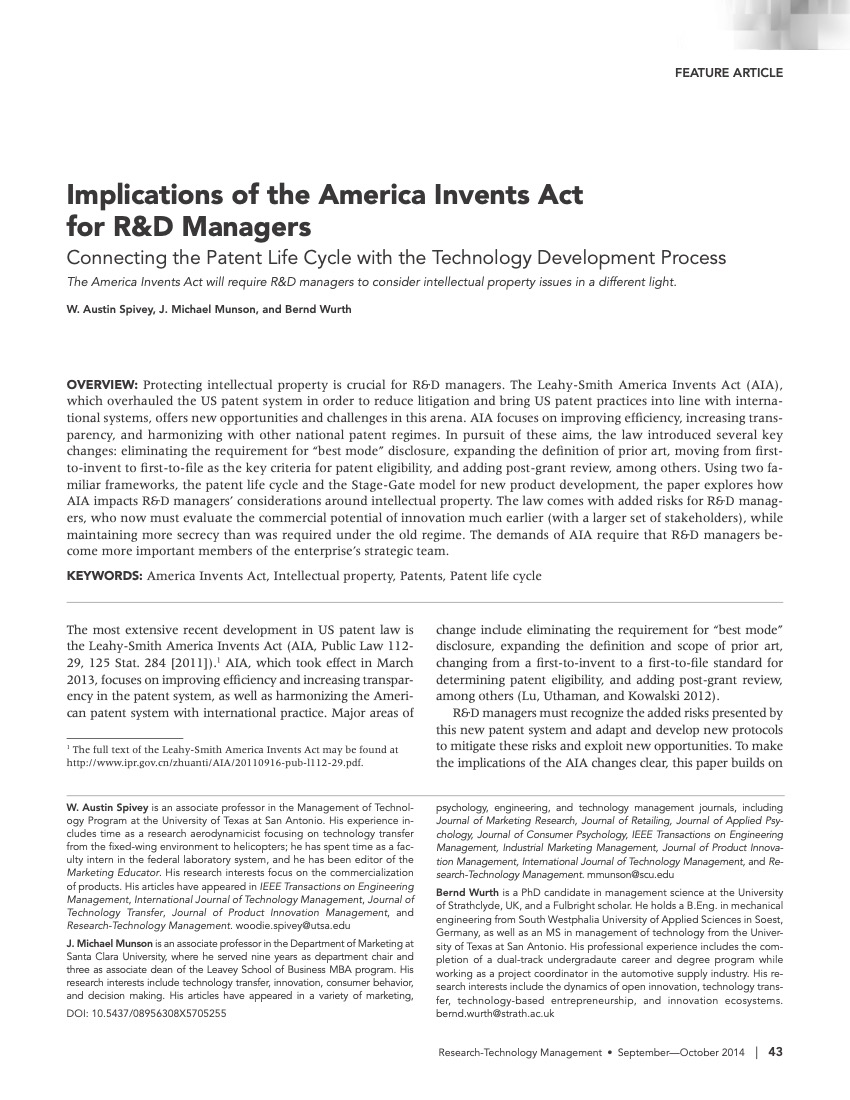 Implications of the America Invents Act for R&D Managers: Connecting the Patent Life Cycle with the Technology Development ProcessW. Austin Spivey, J. Michael Munson, and Bernd WurthResearch-Technology Management, 2014
Implications of the America Invents Act for R&D Managers: Connecting the Patent Life Cycle with the Technology Development ProcessW. Austin Spivey, J. Michael Munson, and Bernd WurthResearch-Technology Management, 2014Protecting intellectual property is crucial for R&D managers. The Leahy-Smith America Invents Act (AIA), which overhauled the US patent system in order to reduce litigation and bring US patent practices into line with international systems, offers new opportunities and challenges in this arena. AIA focuses on improving efficiency, increasing transparency, and harmonizing with other national patent regimes. In pursuit of these aims, the law introduced several key changes: eliminating the requirement for “best mode” disclosure, expanding the definition of prior art, moving from first-to-invent to first-to-file as the key criteria for patent eligibility, and adding post-grant review, among others. Using two familiar frameworks, the patent life cycle and the Stage-Gate model for new product development, the paper explores how AIA impacts R&D managers’ considerations around intellectual property. The law comes with added risks for R&D managers, who now must evaluate the commercial potential of innovation much earlier (with a larger set of stakeholders), while maintaining more secrecy than was required under the old regime. The demands of AIA require that R&D managers become more important members of the enterprise’s strategic team.
@article{spimunwur14, title = {Implications of the America Invents Act for R&D Managers: Connecting the Patent Life Cycle with the Technology Development Process}, author = {Spivey, W. Austin and Munson, J. Michael and Wurth, Bernd}, journal = {Research-Technology Management}, volume = {57}, number = {5}, pages = {43--51}, year = {2014}, doi = {10.5437/08956308X5705255}, dimensions = {true}, google_scholar_id = {Zph67rFs4hoC}, }
